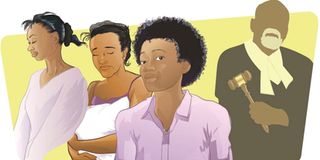On sexual violence, our justice system is worse than boda boda hooligans

On sexual violence, our justice system is worse than bodaboda hooligans.
It has been a while since I joined Chama members for a meeting. As you may be aware I am the only privileged male to be a member of Chama, a women’s only social welfare group. My membership is especially valued when sex matters are being discussed in Chama meetings and a professional view is needed.
“We have called you here today because we would like you to expose to the world the tribulations women go through after sexual and gender-based violence,” the chairperson said in starting off the meeting.
“Yes, we want you to hear stories of these three survivors of rape who have volunteered to speak and also know that many of us are sailing in the same boat but feel safer not going public about it,” a member shouted from the audience. There were three women seated in the corner of the hall. They nodded in agreement.
The chairperson explained that the genesis of convening the meeting was the recent incident involving a diplomat and boda boda riders on Forest Road.
Condemnation
“We were amazed at the outpouring of condemnation of the Boda Boda riders,” the vice chairperson interjected, “yet nobody condemns the justice system that is equally frustrating women and doubling their suffering.”
“Take the murder case against George Floyd,” a member said, “is it not dispensed with? Just listen to Jane, one of our panelists today, she was raped four years ago and the case is nowhere near completion.”
Jane was one of the three women seated at the corner of the hall. Her story was that she was raped and reported the case the next day to the police. Initial hearings were conducted then along the way the prosecutor and the judge were transferred. The case stalled. The accused person was out on bail and roaming around in the estate.
“I met him in the street last week and he mocked me and laughed,” Jane said, “he was with other men and told them that I thought I was smart by reporting the case; that I was still at his mercy and that he could do whatever he wanted with me.”
Then there was Mary. She was also raped and the matter ended up in court. The case started well and the accused person was released on bail. He then skipped court hearings and a warrant of arrest was given by the court. That was the end of the case. The accused person has never been arrested and produced in court. A few weeks ago, Mary saw the person entering a gym. She called the investigating officer who had been handling the case. The officer, a lady herself, said she could not trace the warrant of arrest and so could do nothing about the case.
The third panellist was Rose. She was a university student. She missed a whole year of studies due to the stress of the rape and the many court appearances and adjournments that came with it. She realised that the case was going to take years and unless she let go and focus on her studies she would also be discontinued from the university. She moved on and is not sure whether the case is still going on.
“So in our view, the frustration that comes with seeking justice after facing sexual and gender based violence is worse than what the boda boda operators did to that unfortunate woman,” a member shouted from the audience.
Justice system
“Yes, justice delayed is justice denied, we feel that the justice system in our country is denying us justice, we are suffering quietly and we do not know what else to do, especially if you are a poor woman,” the chairperson interjected.
“We have realised that when it comes to matters sexual harassment, we are on our own, a lot more suffering comes with seeking justice because the system is complex and unsupportive,” another member said.
They then went quiet, expecting me to give my usual expert lecture with tailormade solutions on matters sex. I was unable. I know the law is stringent on these matters; the Sexual Offences Act as well as the Constitutional framework on rights have been lauded globally as transformative yet on the ground experiences of women are distressing.
“I have no solutions for you,” I said, “I am only a doctor and have no insights on how to make the criminal justice system in Kenya work for survivors of sexual violence.”
I noticed that Mary, one of the three survivors, was shedding tears. I left the podium and went and held her hands. She instead hugged and held me, crying her heart out. The other two women started crying too. I noticed that many others in the audience were crying.
“It will be fine, I am sorry that you have to go through this,” I whispered in Mary’s years. That’s all a doctor could do under the circumstances.





